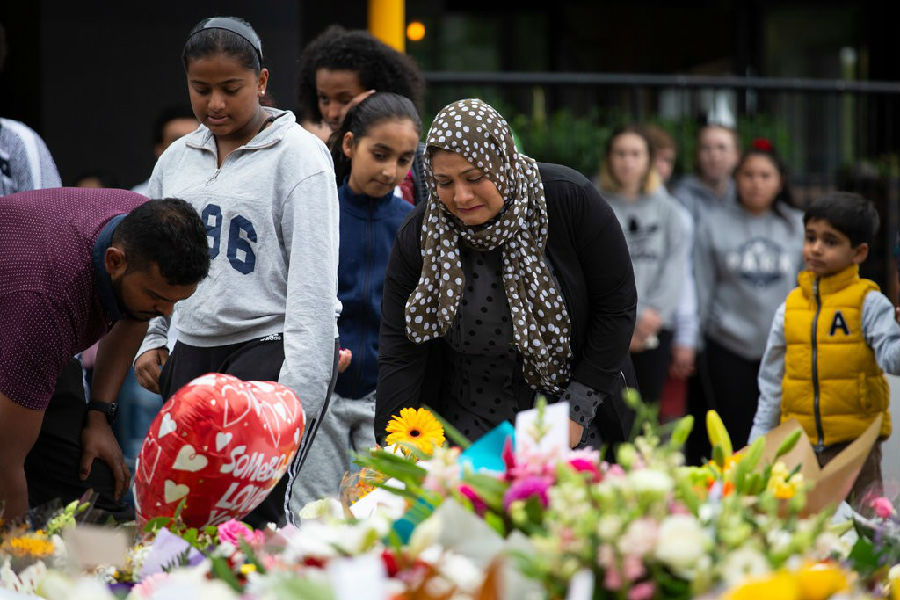After Killings at Mosques, Tears, Hugs and Outrage
清真寺槍擊案后的眼淚,擁抱和憤怒
By Damien Cave and Jamie Tarabay
文/達(dá)米安·凱夫,杰米·塔拉貝
CHRISTCHURCH, New Zealand — The families drifted from the mosques to the hospital, their emotions battered, their eyes bloodshot.
(新西蘭)克賴斯特徹奇——從清真寺轉(zhuǎn)移到醫(yī)院的這些家屬不僅情緒受到了重創(chuàng),眼里也充滿了血絲。
More than a day had passed since the attacks on Friday that killed 50 people at two mosques in Christchurch,
距離周五克賴斯特徹奇兩座清真寺被襲,造成50人死亡已經(jīng)過(guò)去一天多了,
and many still did not know the fate of loved ones they believed were at prayer when the gunman arrived and started firing.
許多人依然沒(méi)有那些他們認(rèn)為襲擊發(fā)生時(shí)正在祈禱的親人的下落。
Akhtar Khokhar, who arrived two months ago from India to visit her son, had come to the hospital for answers.
兩個(gè)月前從印度來(lái)到此地看望兒子的阿赫塔爾·霍哈爾也帶著這一疑問(wèn)來(lái)到了醫(yī)院。
“This is my husband,” she said, holding up a photo before an imam who was at Christchurch Hospital to try to help family members.
“這是我丈夫,”她拿著一張照片對(duì)克賴斯特徹奇醫(yī)院里一位試圖為受害者家屬提供幫助的伊瑪目說(shuō)到。
He shook his head with uncertainty.
伊瑪目不確定地?fù)u了搖頭。
Others faced similar frustrations, with no firm answers about who had died.
其他人也經(jīng)歷著類似的挫折,誰(shuí)已經(jīng)遇難,大家都沒(méi)有確切的答案。
“This is the best they can do?” asked Zuhair Darwish,
“這已經(jīng)是他們所盡的最大的努力了嗎?”祖海爾·達(dá)維什也問(wèn)道,
as his brother’s wife in Jordan kept calling,
他哥哥的妻子在約旦不停地打電話,
desperate, wanting to know whether to plan a funeral.
他迫切地想知道是否要開(kāi)始為哥哥籌備葬禮。
Hours before, the gunman who had inflicted all this pain was charged with one count of murder, with dozens more expected.
數(shù)小時(shí)前,造成這一切痛苦的槍手被控一項(xiàng)謀殺罪名,預(yù)計(jì)還有數(shù)十項(xiàng)罪名在等著他。
Prime Minister Jacinda Ardern, who flew to Christchurch to visit with families,
新西蘭總理杰辛達(dá)·阿德恩也飛到了克賴斯特徹奇安慰受害者家屬,
vowed that “our gun laws will change — now is the time.”
她信誓旦旦地說(shuō)到,“我們會(huì)改變槍支法的——現(xiàn)在就是時(shí)候改變了。”
Minutes before the shooting began on Friday,
周五,距離槍擊開(kāi)始的幾分鐘前,
Ms. Ardern was emailed a copy of the racist manifesto purported to be from the gunman.
阿德恩女士收到了一封電子郵件,里面有一份據(jù)稱來(lái)自此次槍擊案兇手的種族主義宣言。

On Saturday evening, Mr. Darwish, like many others, still could not believe where the horror had landed him:
到了周六晚上,達(dá)爾維什,和許多人一樣,依然無(wú)法相信這一慘案把他帶到了什么地方:
in a hospital cafeteria, renamed a “relatives room,” that was crowded with grief and hot with anger.
醫(yī)院的一個(gè)已經(jīng)改名為“親戚室”,里面充斥著悲傷和憤怒的自助餐廳。
Dozens of family members — teenagers in T-shirts, grandmothers in head scarves, bearded men in jeans — were there,
數(shù)十名家屬——穿著T恤的青少年,戴著頭巾的老奶奶,穿著牛仔褲的大胡子男人——都在那里,
squeezed together and pressing for information from overwhelmed officials.
他們擠在一起,逼迫已經(jīng)不堪重負(fù)的官員透露信息。
“It’s illegal to hide the names from us!”
“向我們隱瞞遇難者的名字是違法的!”
Mr. Darwish shouted at a police official,
達(dá)維什先生對(duì)一名警官喊道,
who was fielding questions while standing on a chair at the back of the room, where few could hear him.
警官當(dāng)時(shí)正站在房間后面的椅子上回答問(wèn)題,但很少有人能聽(tīng)到他說(shuō)話。
“You have to provide them!”
“你必須把名單給我們!”
This was not where they belonged, many of the survivors said.
許多幸存者都說(shuō),他們不是克賴斯特徹奇人。
Bloodshed, terrorism and fear were what some of them had left behind, fleeing countries like Pakistan, Afghanistan and Somalia.
他們中有些人好不容易才從巴基斯坦、阿富汗和索馬里等國(guó)逃了出來(lái),將流血、恐怖主義和恐懼拋在了身后。
Others were born here, used to relative quiet and peace.
其他一些人則是生于斯,習(xí)慣了相對(duì)的安靜與和平的人。
But in the land of emerald green rugby pitches, hatred found them all anyway.
然而,無(wú)論是哪一類人,在這片綠油油的橄欖球場(chǎng)上,都沒(méi)能逃脫仇恨的魔爪。
They responded with the full range of human emotion.
面對(duì)仇恨,這些家屬的心里五味雜陳。
Walking between the mosques and the hospital revealed countless examples of tears and outrage.
走在清真寺和醫(yī)院之間,可以看到無(wú)數(shù)悲傷和憤怒的眼睛。
There was debilitating sadness.
那種悲傷令人虛弱。
There was confusion, but also the kind of love you see in hugs that hold tight and bring tears without concern for who is looking.
然而,除了困惑,我們也能從他們那緊緊的,引人落淚,又毫不在乎路人眼光的擁抱中看到愛(ài)。
譯文由可可原創(chuàng),僅供學(xué)習(xí)交流使用,未經(jīng)許可請(qǐng)勿轉(zhuǎn)載。


